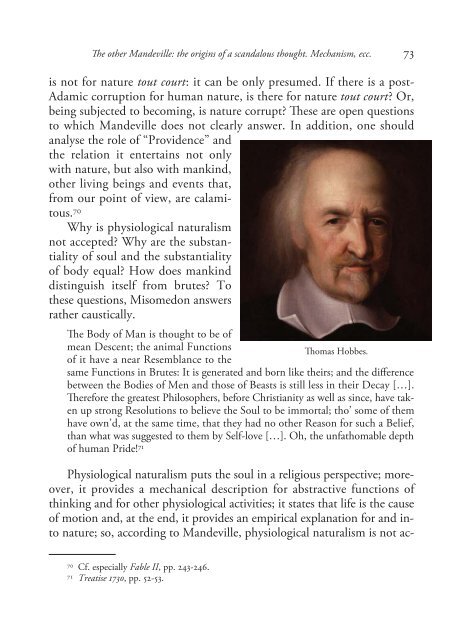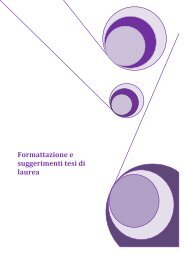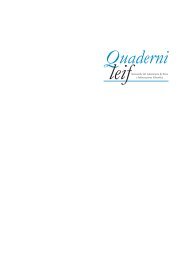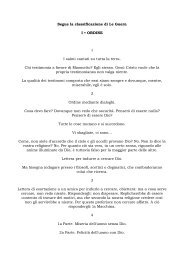qui - maria vita romeo
qui - maria vita romeo
qui - maria vita romeo
You also want an ePaper? Increase the reach of your titles
YUMPU automatically turns print PDFs into web optimized ePapers that Google loves.
e other Mandeville: the origins of a scandalous thought. Mechanism, ecc. 73<br />
is not for nature tout court: it can be only presumed. If there is a post-<br />
Adamic corruption for human nature, is there for nature tout court? Or,<br />
being subjected to becoming, is nature corrupt? ese are open questions<br />
to which Mandeville does not clearly answer. In addition, one should<br />
analyse the role of “Providence” and<br />
the relation it entertains not only<br />
with nature, but also with mankind,<br />
other living beings and events that,<br />
from our point of view, are calamitous.<br />
70<br />
Why is physiological naturalism<br />
not accepted? Why are the substantiality<br />
of soul and the substantiality<br />
of body equal? How does mankind<br />
distinguish itself from brutes? To<br />
these questions, Misomedon answers<br />
rather caustically.<br />
e Body of Man is thought to be of<br />
mean Descent; the animal Functions<br />
of it have a near Resemblance to the<br />
same Functions in Brutes: It is generated and born like theirs; and the difference<br />
between the Bodies of Men and those of Beasts is still less in their Decay […].<br />
erefore the greatest Philosophers, before Christianity as well as since, have taken<br />
up strong Resolutions to believe the Soul to be immortal; tho’ some of them<br />
have own’d, at the same time, that they had no other Reason for such a Belief,<br />
than what was suggested to them by Self-love […]. Oh, the unfathomable depth<br />
of human Pride! 71<br />
omas Hobbes.<br />
Physiological naturalism puts the soul in a religious perspective; moreover,<br />
it provides a mechanical description for abstractive functions of<br />
thinking and for other physiological activities; it states that life is the cause<br />
of motion and, at the end, it provides an empirical explanation for and into<br />
nature; so, according to Mandeville, physiological naturalism is not ac-<br />
70 Cf. especially Fable II, pp. 243-246.<br />
71 Treatise 1730, pp. 52-53.








